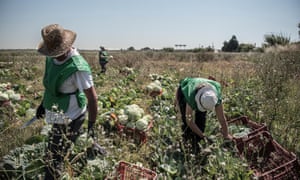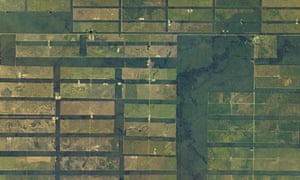“Food waste: harvesting Spain’s unwanted crops to feed the hungry”

Europe wastes some 88m tonnes of food each year – around 173 kg per person – with costs estimated at €143bn (£113bn). Advocates of the new gleaning movements say that its collection could reduce pressure on land use, improve diets, feed the hungry and provide work for the socially excluded.
“Top Peruvian Amazon tourist destination invaded by gold-miners”

The World Travel and Tourism Council predicts that travel and tourism’s “total contribution” to Peru’s GDP will exceed 11% by 2026, but how well, in the long-term, is Peru protecting its best tourist assets? Among foreign tourists easily the most popular destination in the country’s lowland Amazon region is the 274,000 hectare Tambopata National Reserve (TNR) – yet it currently stands invaded by gold-miners.
“Recipe For War: Remove Water and Food, Add Ethnic Strife—Then Stir”

The question is no longer just whether climate change will kill us, but also whether climate change will make us kill each other.
Almost 25 percent of armed conflicts in ethnically divided countries occur around the same time as climate-related disasters. This is the main take-away of a new study by researchers that adds crucial data to a debate that’s been simmering for several years: Is there evidence (PDF) that ties war and civil unrest to the changing climate? Another finding directly applies to this and humanity’s key climate change choke points: food and water. Over the three decades ending in 2010, 9 percent of wars took place in the wake of heat waves or droughts.
“A Mouth Full of Crickets? Lobbyists Speak Up for Edible Insects”

Connoisseurs of edible insects say more and more people are coming to like such dishes, which represent an untapped source of environmentally sustainable protein. And the industry is getting organized to push for further consumer — and government — acceptance.
At a conference of bug-eaters held in May in Detroit, the North American Edible Insect Coalition was organized. It plans to announce a lobbying campaign in a few months to convince the U.S. Food and Drug Administration to add mealworms, crickets protein powder and other insect products to the agency’s database of Generally Recognized as Safe ingredients, or GRAS.
“Cattle Grazing Is Now Causing Massive Deforestation Hotspots In The Peruvian Amazon”

Deforestation in the Amazon has been a growing problem over the past five decades, with ranchers leading the way in clearing rainforest for cattle and cultivation. But while Brazil, the largest country in South America, seems on track to reduce deforestation, other major Amazonian countries like Peru are increasingly struggling to protect their share of the world’s largest rainforest.
“Soaring Temperatures Will Make It Too Hot to Work, UN Warns”

Searing temperatures caused by climate change may cost global economies more than $2 trillion by 2030, restricting working hours in some of the poorest parts of the world, according to United Nations research. As many as 43 countries, especially those in Asia, including China, Indonesia, and Malaysia, will experience declines in their economies because of heat stress, says Tord Kjellstrom, a director at the Health and Environment International Trust, based in Nelson, New Zealand. As a result, China’s gross domestic product would be reduced 1 percent and Indonesia’s by 6 percent by 2030.
“Cow Urine Can Sell for More Than Milk in India”

http://www.bloomberg.com/news/articles/2016-07-17/cow-urine-can-sell-for-more-than-milk-in-india
Distilled urine from female cattle currently fetches at least as much as milk in India.
“Biodiversity is below safe levels across more than half of world’s land – study”

Habitat destruction has reduced the variety of plants and animals to the point that ecological systems could become unable to function properly, with risks for agriculture and human health, say scientists.
“Suburban birds angrier, more agressive than their rural peers”

City life demands a more aggressive disposition — for humans and for bids. The same goes for suburban life.
A new study found birds living among suburban environs exhibit higher levels of territorial aggression than their peers from the country. The closer to the city, the angrier the birds.

Recent Comments